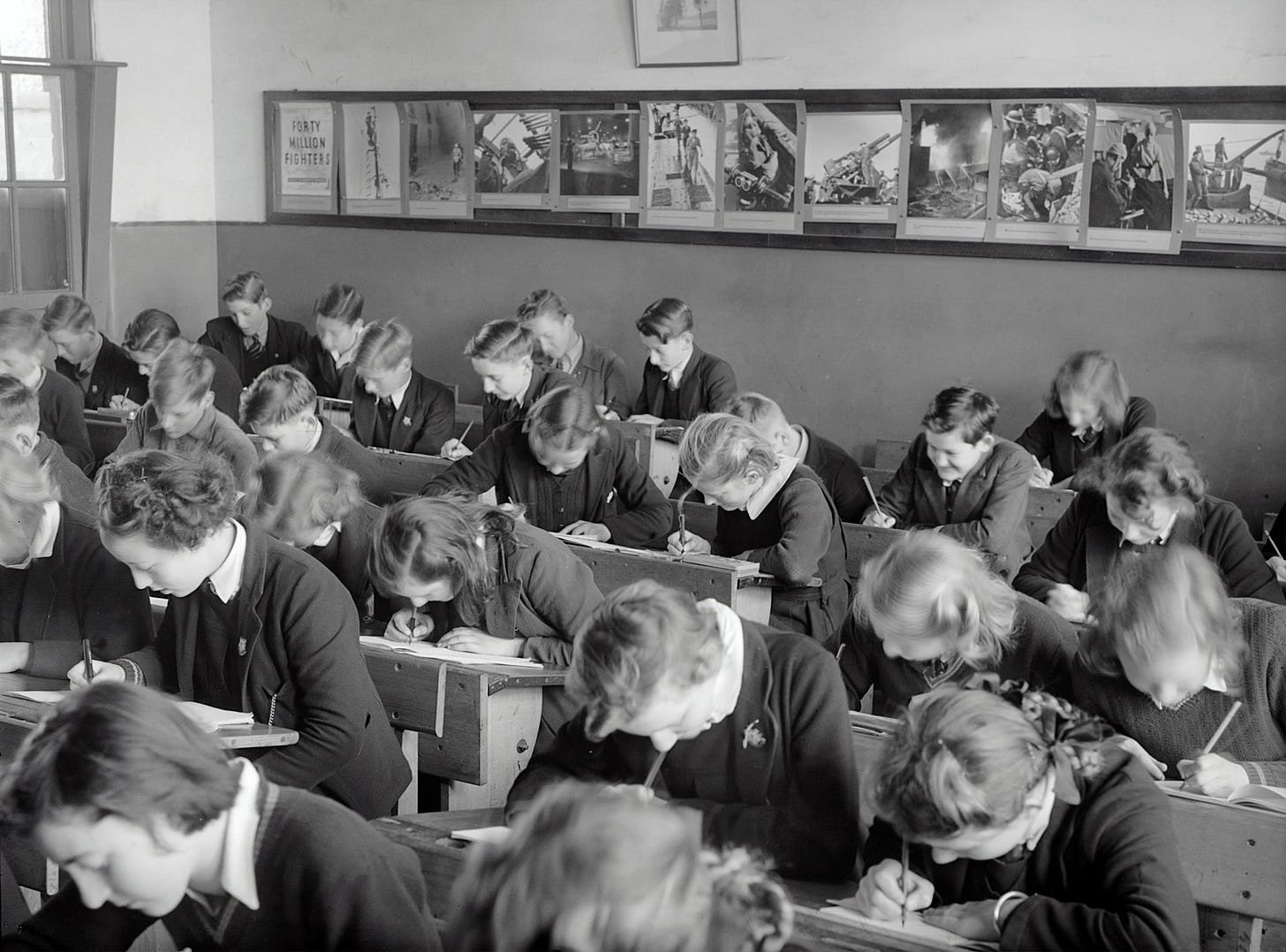On Tuesday, I came to work and wrote the date and address of my school on the whiteboard. My English students didn’t need the school’s address. The kids taking the AP Human Geography exam did. Nineteen masked high school sophomores filed in, and each accepted an answer Scantron, shrink-wrapped booklets, and a sheet of adhesive-backed labels with a personal barcode. For two hours and fifteen minutes, they were taking an exam, and I was one of their proctors.

Perhaps you recall your standardized test proctors, droning a lengthy script of instructions about the verboten mechanical pencil and emphasizing how you must fill in the Scantron bubbles neatly and completely. You can hear them clicking loudly past your desk in sensible pumps. Kicking their feet up on the table in front and grading papers, slurping coffee. Roving their hawk eyes over the rows of students while you sweated over multiple choice. Gazing serenely out the window while you raced through the essay section.
My style of supervision — “invigilation,” as a British school where I once worked called it — has historically been 70% active (looking up, walking around) and 30% passive (sitting down, looking at my phone). But today, I was reminded in no uncertain terms that the College Board, peace be upon them, would prefer their proctors to be vigilant at all times, neither texting nor reading nor correcting papers nor, I assume, ordering new clothes hangers from Amazon. So, for the first section of the test, I resolved to be really good at proctoring. I was going to glance periodically at my proctor script (it was four pages long) and get my bearings about the next phase of booklet collection, preparing myself mentally to walk around the room and retrieve these sheaves of paper in exactly the right order according to the seating chart. But otherwise I’d bring my eyes to the room in front of me. The students, for their part, would compliantly scribble away. I would match their diligence. I’d be the un-distracted supervisor.
If you are longing for a retreat from the world, perhaps you are picturing a Buddhist monastery in Tibet, a cottage in the country with an extremely walkable meadow, or an ashram where the air is rose-colored with dusty light. There, you imagine, you’ll clear your head through meditation, and it will feel like freedom. Perhaps there, in this far-off place of peace, with the droning of insects to accompany the river of your thoughts, your mind will cease its churn and drift along at a pace that feels open, curious, beautiful. Such a sense of soulful calm would be well worth the price of the airline ticket, perhaps you think to yourself.
There is no need to book a ticket to such a place. If you have the chance to be a rule-following AP Exam proctor, a spiritual journey awaits. Supervise an incident-free exam the way the College Board says you should, by putting away smartphone-ish things and resolving not to be entertained for an hour at a stretch, and you, too, can achieve this higher plane. Seated upon a metal chair, hearing the scratch of #2 pencils while nineteen supplicants to the gods of academic success make their own sacrifices and offerings, you can gaze into the middle distance and appear to be watching for “irregularities” (cheating). However, in the privacy of your own mind, and un-stimulated by the home screen of your phone, you can begin to listen to those pencils and the rustle of exam booklets. You can feel the press of your toes against the sole of your shoes. You can forget that you’re waiting for an email confirming the new hire in your department. You can forget what you were going to make for dinner because you aren’t looking online for a recipe.
You can remember, gently, what these exams were like for you as a high-schooler. You can realize with fresh buoyancy that you’re fifteen years away from the grasp of the College Board, free of its terrifying hold on your teen imagination. You don’t judge your younger self for having stressed about those exams, nor do you interrupt your happiness by insisting on the magnitude of your adult stressors such as, “Well, there’s rent now.” You just wander this pristine mental quiet. Your mind even goes pleasantly blank for a few minutes at a stretch. You let it.
It is absolutely bonkers that this river of calm is flowing sweetly behind a veil that looks like unbearable boredom.
I’m not sure why I decided to embrace the boredom today. Maybe my rule-following self just kicked in. Maybe I’m tired of trying to make every moment of inactivity into a moment where I am productive. In any case, I was taken by surprise — a moment of contemplative stillness reached me the way most revelations should, I suppose, without my planning to receive it. It made me realize I hadn’t meditated or prayed in a long time, which is a little embarrassing. I like to think I have an inner life. I’ve just been paralyzed by the desire to keep finding out what’s on my screen.
Maybe there are other moments like this one that I’m missing. The grocery store line? A long subway ride? I don’t actually ever really sit on the benches in the park where I walk. You’d think that fourteen months of quarantine would have afforded many opportunities for meditative stillness. Then again, maybe May of 2021 is one of the first moments of the pandemic in which being alone with my thoughts, and letting them go where they will, has appealed to me as a relief, rather than the recipe for a stress spiral. Proctoring today made me curious about how deeply, and how happily, I could be alone with my thoughts if I tried again.
The sun is out and the #2 pencils are sharp. May final exam season bring you peace, also.



